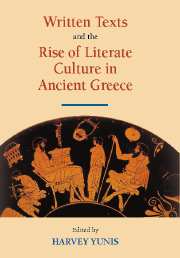Book contents
- Frontmatter
- Contents
- Preface
- Contributors
- Introduction: Why Written Texts?
- 1 From Letters to Literature: Reading the “Song Culture” of Classical Greece
- 2 Writing Religion: Inscribed Texts, Ritual Authority, and the Religious Discourse of the Polis
- 3 Letters of the Law: Written Texts in Archaic Greek Law
- 4 Writing, Law, and Legal Practice in the Athenian Courts
- 5 Literacy and the Charlatan in Ancient Greek Medicine
- 6 Literacy in Greek and Chinese Science: Some Comparative Issues
- 7 Writing Philosophy: Prose and Poetry from Thales to Plato
- 8 Prose Performance Texts: Epideixis and Written Publication in the Late Fifth and Early Fourth Centuries
- 9 Writing for Reading: Thucydides, Plato, and the Emergence of the Critical Reader
- 10 Reflecting on Writing and Culture: Theocritus and the Style of Cultural Change
- Bibliography
- Index
7 - Writing Philosophy: Prose and Poetry from Thales to Plato
Published online by Cambridge University Press: 30 July 2009
- Frontmatter
- Contents
- Preface
- Contributors
- Introduction: Why Written Texts?
- 1 From Letters to Literature: Reading the “Song Culture” of Classical Greece
- 2 Writing Religion: Inscribed Texts, Ritual Authority, and the Religious Discourse of the Polis
- 3 Letters of the Law: Written Texts in Archaic Greek Law
- 4 Writing, Law, and Legal Practice in the Athenian Courts
- 5 Literacy and the Charlatan in Ancient Greek Medicine
- 6 Literacy in Greek and Chinese Science: Some Comparative Issues
- 7 Writing Philosophy: Prose and Poetry from Thales to Plato
- 8 Prose Performance Texts: Epideixis and Written Publication in the Late Fifth and Early Fourth Centuries
- 9 Writing for Reading: Thucydides, Plato, and the Emergence of the Critical Reader
- 10 Reflecting on Writing and Culture: Theocritus and the Style of Cultural Change
- Bibliography
- Index
Summary
Philosophy is a talkative subject, and it must have begun in conversation. Unfortunately, all we have from the early period is texts, and these are not abundant. But if evidence for the use of writing in philosophy before Plato is fragmentary, evidence for oral performance in this period is almost nonexistent. What little we know is generally derived from Plato, like the picture of Zeno reading his arguments before a small audience in the Parmenides. But how well informed was Plato about practices a century earlier? Was Heraclitus' book designed to be read aloud before such an audience? Or does the report that Heraclitus deposited his book in the temple of Artemis mean that he wanted to keep it out of circulation? Did Parmenides and Empedocles compose their verses for public performance, or only for easier memorization? We do not have answers to such questions, and I will have little to say about conditions of performance or publication.
My topic, then, is the written use of prose and poetry in the development of Greek philosophy in its first two centuries, from Thales to Plato. I am using philosophy here as an abbreviation for “philosophy and science.” The distinction is not always a useful one to draw in the Presocratic period. It is characteristic of Greek philosophy in its formative period – as again of European philosophy in the seventeenth century – that it develops in close conjunction with mathematics and natural science.
- Type
- Chapter
- Information
- Written Texts and the Rise of Literate Culture in Ancient Greece , pp. 139 - 161Publisher: Cambridge University PressPrint publication year: 2003
- 10
- Cited by



